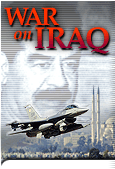|
|
|
||||
| ||||||||||||||||||
|
|

|
|
Report: No proof Iraq had
chemicals
WASHINGTON, D.C. -- The Defense Intelligence Agency, the Pentagon's main spy unit, stated in a report last fall that there was "no definitive, reliable information" that Iraq was producing or stockpiling chemical or biological weapons, casting the most serious doubts yet on the Bush administration's prewar contentions that Saddam Hussein was operating a widespread gas and germ warfare program. Still, the document expressed confidence that Saddam's regime was concealing unconventional weapons, basing that conclusion on unspecified pieces of intelligence that indicated Iraq hid activities from U.N. inspectors scouring the country at the time. But the findings in the September 2002 report, which was made public Friday, indicate that a key unit of the U.S. intelligence community had no hard information at that time supporting the White House contention that Iraq posed an imminent and intolerable threat because of weapons of mass destruction.
The disclosures place even more pressure on the Bush administration to substantiate its justification for the preemptive invasion launched in March, and raised questions about the ability of U.S. intelligence agencies to track illicit weapons activities successfully. Two months after Saddam's regime was ousted, no weapons of mass destruction have been found. The items closest to being evidence of the existence of such weapons in Iraq are two trailers turned over to the U.S. military that the Pentagon believes were designed to make biological toxins. However, U.S. and British intelligence analysts with direct access to the evidence are disputing claims that the trailers were for making deadly germs, the New York Times reported. In interviews with the Times, the analysts said the mobile units were more likely for other purposes and charged that the evaluation process had been damaged by a rush to judgment. "Everyone has wanted to find the 'smoking gun' so much that they may have wanted to have reached this conclusion," said one intelligence expert who spoke on condition of anonymity. "I am very upset with the process." Stephen Cambone, undersecretary of defense for intelligence, said Friday that a beefed-up military search team called the Iraq Survey Group will arrive in Iraq on Monday to begin a more thorough search for the elusive weapons program. The White House says it remains confident the program will be found. The team of 1,400 analysts, interpreters and document specialists "will now begin a very rigorous, analytically driven effort to identify the Iraqi WMD program," he said in a news conference. Meanwhile, senior intelligence officials downplayed the findings, first reported this week by U.S. News and World Report. They acknowledged that the Defense Intelligence Agency could not find facilities indentifiable as having been part of a weapons of mass destruction program. But that did not undercut their belief that one existed in Iraq. "In September 2002, we could not specifically pin down individual facilities operating as part of the weapons of mass destruction programs, specifically the chemical warfare portion," Vice Admiral Lowell Jacoby, agency director, told reporters Friday. "It is not in any way intended to portray the fact that we had doubts that such a program existed, that such a program was active, or such a program was part of the Iraqi WMD infrastructure." He said the Defense Intelligence Agency ultimately signed on to the view that Iraq "had a weapons of mass destruction program in place." The report discussed what it called "unusual munitions transfer activity," a reference to suspicious moves made under the cover of night, that led analysts to believe that Iraq "probably had (a chemical warfare) agent," and cited undisclosed intelligence that the Iraqi regime "does have (biological warfare) agents stockpiled that could be weaponized in the event of war," according to a U.S. intelligence official who was provided a copy. "Were there indicators that they could have a program? The answer would be 'yes,' " the official said. "But if you asked an intelligence analyst if this is (definitely) happening, he would say there is no evidence." It was unclear whether the conclusions by the Pentagon spy agency were included in a broader assessment -- the consensus view of all intelligence agencies -- and provided to President Bush in December. A U.S. intelligence official, who asked not to be identified, said the National Intelligence Estimate did include the analysis. The estimate concluded that Iraq did have weapons of mass destruction, and predicted that Saddam's regime would continue to develop them, according to intelligence officials. The Central Intelligence Agency and congressional committees have recently launched reviews of that summary of intelligence, in response to allegations that its findings were exaggerated. Fuel for critics The defense agency's report, which includes secret satellite photos of various Iraqi facilities, lent new ammunition to critics of the Bush administration who contend intelligence information was exaggerated to justify military action. "Publicly, the administration was picking things to fit its agenda," said David Albright, a former U.N. nuclear inspector and now president of the Institute for Science and International Security in Washington. A German inspector, who left Iraq in March, said Friday that the prewar assertions were "all a big bluff." © Copyright 2003 Star
Tribune. All rights reserved.
|
|
| |||||||||||||||||||||||||||||||||||||||||||||
|
|